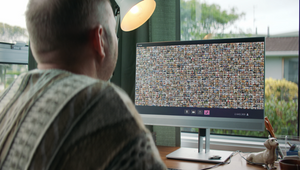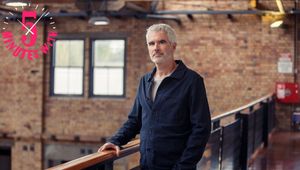
Can The Industry Bridge the Gender Gap?

Last month, The New Zealand Herald published a front-page article about the lack of female representation in advertising’s senior management roles, and the challenges of being a working mother in the industry. The piece drove a huge amount of conversation locally, with a (paywall-free) article on LinkedIn also striking a chord.
The article’s author, Isobel Kerr-Newell, drew on her own experiences having recently become a mother as well as research on the industry’s gender imbalance more generally. To find out more about the issues, as well as the steps we can take to address them, LBB’s Adam Bennett spoke to Isobel.
LBB> Congratulations, your article certainly seems to have tapped into something a lot of people are feeling! What made this the right time to make the point?
Isobel> Naturally, becoming a parent was the main catalyst for my focus on the topic, but there were also a few other events that aligned and ultimately compelled me to share my story.
The first was yet another year of low representation of women in business leadership in New Zealand. While we might have an exceptional woman in our nation’s top job, the latest numbers released showed New Zealand once again lagged behind the rest of the world when it came to women on boards and in CEO roles.
Figures released by the NZX earlier this year showed the percentage of female directors on listed company boards at just 22%. There were also 27 New Zealand listed companies or 18% with no women on their boards. By comparison, just 4.4% of Australian companies have no female directors and in the US it’s only 2.6% .
In many areas, we are such a progressive and inclusive nation. We were the first to give women the vote and have an incredible history of strong female leaders in government, but there is still a lot of work to be done when it comes to women in business.
Taking the lens to our advertising industry in New Zealand, we’re also still massively under-indexing on women in leadership. Out of the top agencies here, we only have one female CEO, just a handful at MD level and even fewer leading our creative departments. I’m pleased to say that Saatchi & Saatchi New Zealand has a 50/50 gender split across both our leadership team and now our creative department too, but that’s certainly not the case everywhere.
Before I went on maternity leave, there was also a piece of research released around the “motherhood penalty” that floored me. In summary, it said my decision to have a child was most likely going to negatively impact my career and future earnings for ever, whereas my husband was likely going to be viewed more favourably and afforded better opportunities as a result of becoming a father. On the whole, I felt I’ve been dealt a pretty even hand throughout my career, but this study was a bit of a lightning bolt moment and really made me feel that something needed to change.
I was also encouraged by a piece of research conducted by Global Women and Champions for Change that looked at ways to keep more women in the pipeline towards leadership positions. It identified key blockages along the way and motherhood (or the mere chance we might become mothers) was clearly the biggest potential derailer for a woman’s career and potential earnings. The research also suggested that having relatable role models was a critical factor for women coming through, so all that combined with a great chat with the New Zealand Herald’s Online Business Editor Damien Venuto, led me to put pen to paper.
LBB> Have you been encouraged by the feedback you've received?
Isobel> The feedback on the article has been truly overwhelming. Firstly the support from the Herald in helping me raise this important topic was incredible and I’d like to thank Damien and all the team for giving me such a powerful platform. The piece ran online initially, then went out through their radio partners and eventually made its way to the front page of the weekend paper. I was inundated with messages from women and men from all over the world talking about how the piece had connected with them and confirming these were conversations we need to be having more often across all sectors.
As someone who’s spent my entire career helping others into the spotlight, sharing my own story was not entirely comfortable. I was nervous about voicing my opinion, but the response gave me confidence that these were things that needed to be said. The more openly we talk about these issues and ways to positively address them together, the further we can move forward.
Since then, and given the level of engagement, I’m looking at how I can harness some of the positive energy and momentum generated and gather some of these like-minded people together to help progress these issues in 2020.
LBB> And have you found any elements of the reactions to be discouraging?
Isobel> To date, and quite astonishingly to me, the response has been entirely positive. I had braced myself for what I assumed would be an inevitable tidal wave of negativity – mummy and body shaming included. But perhaps that was just my imposter syndrome talking too loudly and I needed to have a little more faith in myself and the message.
LBB> Why do you feel it is that employers tend to look favourably on men who have become fathers, but we don't see that trend replicate with mothers?
Isobel> While any decent employer would say there is no difference in how they view a male or female who has recently become a parent, the deeply held gender stereotypes and our assumptions around parental roles are pretty hard to shake.
The research around the “motherhood penalty” suggests that having a child will increase the gender pay gap for women and set them on a permanent course for lower lifetime earnings than men, however a man who becomes a father will actually be viewed more favourably as a result of having children. The assumption seems to be that a father will double down at work, be more loyal, less likely to take risks or rock the boat with the new-found responsibility of providing for their family upon them. Women however, generally get lumped with the view that they’ll be less focused on work, have “other priorities”, won’t be able to stay late and won’t be so driven. In a demanding client-service industry like advertising, you can see how these biases, however unconscious or subtle they might be, could prove detrimental to the long term trajectory of a woman's career.
The only way we’re really ever going to overcome this is by normalising parental leave and primary caregiving for fathers too. In line with this, we’ve just increased our parental leave benefits for fathers, giving them the option to take on the primary caregiver role if they choose to and receive the financial support to do this while their partner returns to work. We’re also in the process of rolling out flexible working, to allow all of our people, parents or not, the ability to fit work into their life and not the other way around.
LBB> Was there something specific that happened to you which motivated you to write the piece, or was it building up for some time beforehand?
Isobel> One of the biggest motivations was what I was observing happening to women in the industry around me. Brilliant friends, former colleagues and friends of friends seemed to be reaching a certain point in their careers, but not being able to get up into the next level. Over the years, I’ve also seen too many talented women opt out of the industry or be nudged out because of the clash between advertising career and kids.
I was also driven by the realisation that the flexibility and understanding I had from my employer when I returned to work as a new mum, definitely wasn’t universal. I was able to take a decent amount of time out thanks to our paid parental leave scheme, enjoy flexible but full time work that still allowed me to be the mother I wanted to be, and progress my career at the same time. Talking to other mothers in the industry and beyond though, I came to realise what a rare situation this actually was. All that said, it’s still a constant juggle and a delicate balance held together by fish fingers and dry shampoo, but for now, it’s working for me, my family and my employer.
LBB> Do you think that the industry overall is moving in the right direction with this - if so, is it moving quickly enough?
Isobel> I think there’s much greater awareness of the issues now and we’re definitely moving in the right direction. But doing, not just saying is everything. And I think we’ve still got a long way to go.










